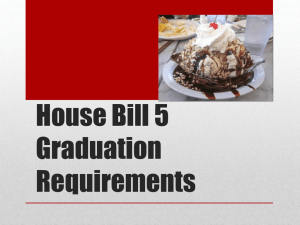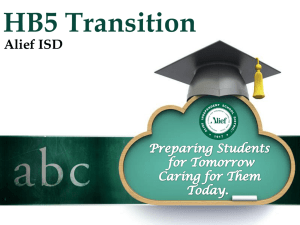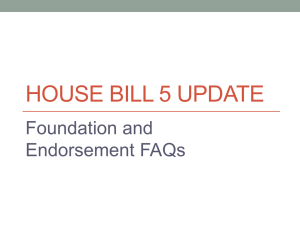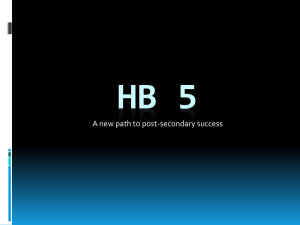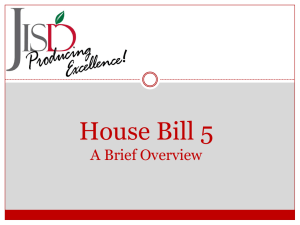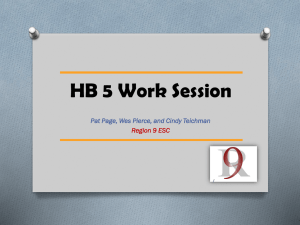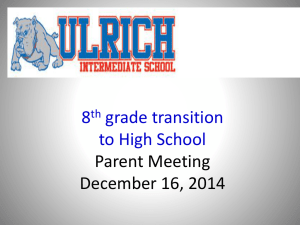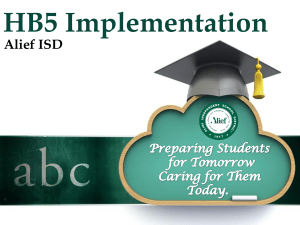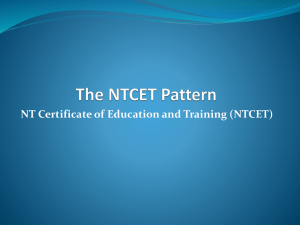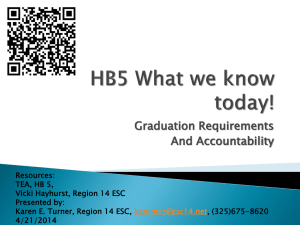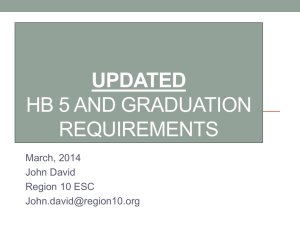TEA Curriculum Update - Crest Coalition of reading and english
advertisement
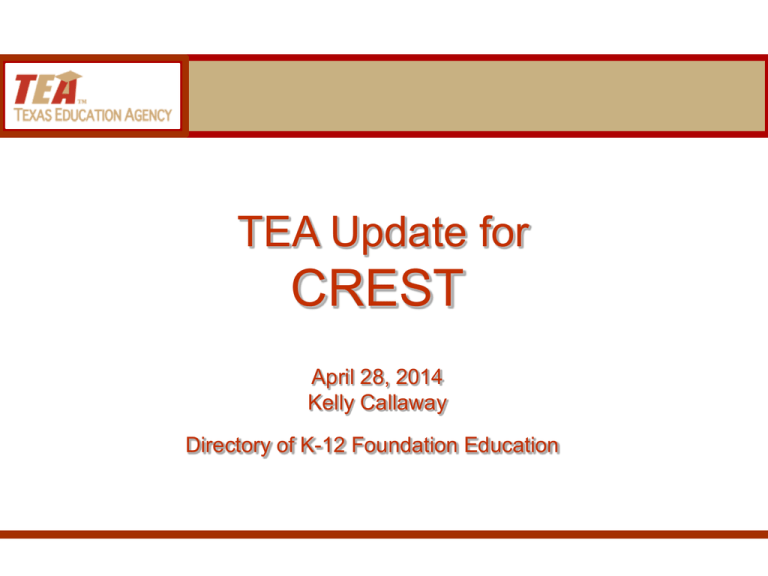
TEA Update for CREST April 28, 2014 Kelly Callaway Directory of K-12 Foundation Education SB 172 – Multidimensional Assessment Tools for Kindergarten “A multidimensional assessment tool on the commissioner’s list must either include a reading instrument and test at least three developmental skills, including literacy, or test at least two developmental skills, other than literacy, and be administered in conjunction with a separate reading instrument that on a list adopted under this subsection.” TEC, §28.006(b) SB 172 – Multidimensional Assessment Tools for Kindergarten • Panel of child development and assessment experts convened to identify criteria • Request for Student Multidimensional Assessment Tools for Kindergarten posted to Texas Register on Friday, April 25, 2014 • Deadline for submissions Friday, May 23, 2014 • Multidimensional Assessment Tools meeting criteria to be included on 2014-15 Commissioner’s List of Reading Instruments Write for Texas • Professional development designed to improve writing instruction in secondary ELA/Reading, math, science, and social studies classrooms • A series of facilitated online courses (two hours each) paired with in-classroom support from writing coaches • Coaching and support available through education service centers and Texas Writing Project sites • Courses, resources, and assistance from statewide online facilitators available at no cost to all districts Write for Texas – Online Courses 1. Using Reading and Writing to Support Learning (all content areas, grades 6-12) 2. Writing Effective Sentences (all content areas, grades 6-12) 3. Teaching Expository Writing (all content areas, grades 6-12) 4. Teaching Persuasive Writing (all content areas, grades 6-12) 5. Teaching Narrative and Literary Writing (ELA, grades 6-9, but others may participate) Write for Texas – Guiding Principles for Effective Writing Instruction 1. Use writing and reading to support student learning in all content areas. 2. Teach students the thinking skills, processes, and knowledge needed to write effectively. 3. Teach students skills for writing effective sentences in order to create coherent texts. 4. Provide extra assistance and instruction to students who experience difficulty learning to write. House Bill 5 and High School Graduation Requirements Foundation High School Program • HB 5 gives the SBOE decision-making authority in a number of areas related to the new high school graduation requirements. • The SBOE adopted new rules for the Foundation High School Program on January 31, 2014. • There have been numerous opportunities for input and feedback throughout the rulemaking process. • The SBOE is expected to adopt new rules regarding which courses school districts will be required to offer in April 2014. Foundation High School Program • The Commissioner has adopted rules to allow fourth year seniors who are unable to complete the requirements of one of the current graduation programs to graduate on the Foundation High School Program in spring 2014. http://ritter.tea.state.tx.us/rules/tac/chapter074/ch074bb.html • The Commissioner has adopted a transition plan to replace the MHSP, RHSP, and DAP with the Foundation High School Program beginning with the 2014-2015 school year. • Students who are in grade 9, 10, or 11 in the 2013-2014 school year must be given a choice to graduate on the MHSP, RHSP, DAP, or Foundation High School Program. Foundation – Statutory Requirements Beginning in the 2014-2015 school year, a school district must ensure that each student, on entering ninth grade, indicates in writing an endorsement that the student intends to earn. A district must permit a student to choose, at any time, to earn an endorsement other than the endorsement the student previously indicated. Foundation – Statutory Requirements A student may graduate under the foundation high school program without earning an endorsement if, after the student’s sophomore year (1) the student and the student ’s parent or person standing in parental relation are advised by a school counselor of the specific benefits of graduating from high school with one or more endorsements; and (2) the student ’s parent or person standing in parental relation files with a school counselor written permission, on a form adopted by the agency, allowing the student to graduate under the foundation high school program without earning an endorsement. Foundation – Statutory Requirements English Language Arts Four credits • English I • English II • English III • Advanced English Course Mathematics Three credits • Algebra I • Geometry • Advanced Mathematics Course Science Three credits • Biology • IPC or Advanced Science Course • Advanced Science Course Social Studies Three credits • U.S. History • U.S. Government (one-half credit) • Economics (one-half credit) • World Geography or World History or Combined World History/World Geography (course not developed yet) Foundation Advanced Courses SBOE Rule English Language Arts English IV Independent Study in Journalism Independent Study in English Advanced Broadcast Journalism III Literary Genres Advanced Journalism: Newspaper III Creative Writing Advanced Journalism: Yearbook III Research & Technical Writing AP English Literature and Composition Humanities IB Language Studies A1 Higher Level Public Speaking III Business English Oral Interpretation III Communication Applications (must be combined with another half credit from this list) Debate III locally developed ELA course or other activity [pursuant to TEC, §28.002(g-1)] Independent Study in Speech College Prep ELA [pursuant to TEC, §28.014] Foundation Advanced Courses SBOE Rule Third Mathematics Credit * Mathematical Models with Applications AP Calculus BC * Mathematical Applications in AFNR AP Computer Science * Digital Electronics IB Mathematical Studies Standard Level (SL) * Robotics Programming and Design IB Mathematics SL Algebra II IB Mathematics Higher Level (HL) Precalculus IB Further Mathematics HL AQR Engineering Mathematics Independent Study in Math Statistics & Risk Management Discrete Mathematics for Problem Solving Discrete Mathematics for Computer Science AP Statistics locally developed math course or other activity [pursuant to TEC, §28.002(g-1)] AP Calculus AB mathematics course endorsed by an IHE [pursuant to TEC, §28.025(b-5)] Algebraic Reasoning (in development for implementation in 2015-2016) Statistics (in development for implementation in 2015-2016) Foundation Advanced Courses SBOE Rule Second Science Credit Integrated Physics and Chemistry (IPC) Physics Chemistry Principles of Technology AP Chemistry AP Physics 1: Algebra-Based IB Chemistry IB Physics Foundation Advanced Courses SBOE Rule Third Science Credit Chemistry IB Physics Physics IB Environmental Systems Aquatic Science Advanced Animal Science Astronomy Advanced Plant and Soil Science Earth and Space Science Anatomy and Physiology Environmental Systems Medical Microbiology AP Biology Pathophysiology AP Chemistry Food Science AP Physics 1: Algebra-Based Forensic Science AP Physics 2: Algebra-Based Advanced Biotechnology AP Physics C Principles of Technology AP Environmental Science Scientific Research & Design IB Biology Engineering Design & Problem Solving IB Chemistry Principles of Engineering locally developed science course or other activity [pursuant to TEC, §28.002(g-1)] science course endorsed by an IHE [pursuant to TEC, §28.025(b-5)] Foundation – Statutory Requirements Physical Education One credit Languages Other Than English *Two credits in the same language Fine Arts One credit Electives Five credits *Includes computer programming languages and some exceptions Languages Other Than English (LOTE) SBOE Rule • Any two levels in the same language • Two credits in computer programming languages selected from Computer Science I, II, and III (set to expire in 2016) If a student, in completing the first credit of LOTE, demonstrates that the student is unlikely to be able to complete the second credit, the student may substitute another appropriate course as follows: • Special Topics in Language and Culture • World History Studies or World Geography Studies for a student who is not required to complete both by the local district • Computer programming languages • A different language course Languages Other Than English (LOTE) SBOE Rule A student, who due to a disability, is unable to complete two credits in the same language in LOTE, may substitute • a combination of two credits from English language arts, mathematics, science, or social studies; or • two credits in career and technical education or technology applications. The determination regarding a student's ability to complete the LOTE credit requirements will be made by • the student's ARD committee if the student receives special education services under the TEC, Chapter 29, Subchapter A; or • the committee established for the student under Section 504, Rehabilitation Act of 1973 (29 United States Code (USC), §794). Speech Requirement SBOE Rule A specific speech course will not be a requirement under the Foundation High School Program. New Requirement: To receive a high school diploma, a student must demonstrate proficiency, as determined by the district in which the student is enrolled, in the following: • Delivering clear verbal messages • Choosing effective nonverbal behaviors • Listening for desired results • Applying valid critical-thinking and problem-solving processes • Identifying, analyzing, developing, and evaluating communication skills needed for professional and social success in interpersonal situations, group interactions, and personal and professional presentations Endorsements – Statutory Requirements A student may earn an endorsement by successfully completing the following: • Curriculum requirements for the endorsement • Four credits in mathematics • Four credits in science • Two additional elective credits Endorsements – Statutory Requirements Each school district must make available to high school students courses that allow a student to complete the curriculum requirements for at least one endorsement. A school district that offers only one endorsement curriculum must offer the multidisciplinary studies endorsement curriculum. A school district defines advanced courses and determines a coherent sequence of courses for an endorsement area, provided that prerequisites are followed. A course completed as part of the set of four courses needed to satisfy an endorsement requirement may also satisfy a requirement under the Foundation High School Program, including an elective requirement. Endorsement Advanced Courses SBOE Rule Fourth Mathematics Credit to Earn an Endorsement Algebra II IB Mathematical Studies Standard Level (SL) Precalculus IB Mathematics SL Advanced Quantitative Reasoning IB Mathematics Higher Level (HL) Independent Study in Math IB Further Mathematics HL Discrete Mathematics for Problem Solving Engineering Mathematics AP Statistics Statistics & Risk Management AP Calculus AB Discrete Mathematics for Computer Science AP Calculus BC locally developed math course or other activity [pursuant to TEC, §28.002(g-1)] AP Computer Science mathematics course endorsed by an IHE [pursuant to TEC, §28.025(b-5)] Math Models (for the 2014-2015 school year only) College Prep Math [pursuant to TEC, §28.014] Algebraic Reasoning (in development for implementation in 2015-2016) Statistics (in development for implementation in 2015-2016) *Note: A course on this list may be taken either before or after one of the following courses: Mathematical Models with Applications, Mathematical Applications in Agriculture, Food, and Natural Resources, Digital Electronics, Robotics Programming and Design Endorsement Advanced Courses SBOE Rule Fourth Science Credit to Earn an Endorsement Chemistry IB Physics Physics IB Environmental Systems Aquatic Science Advanced Animal Science Astronomy Advanced Plant and Soil Science Earth and Space Science Anatomy and Physiology Environmental Systems Medical Microbiology AP Biology Pathophysiology AP Chemistry Food Science AP Physics 1: Algebra-Based Forensic Science AP Physics 2: Algebra-Based Advanced Biotechnology AP Physics C Principles of Technology AP Environmental Science Scientific Research & Design IB Biology Engineering Design & Problem Solving IB Chemistry Principles of Engineering locally developed science course or other activity [pursuant to TEC, §28.002(g-1)] science course endorsed by an IHE [pursuant to TEC, §28.025(b-5)] STEM – SBOE Rule A student may earn a STEM endorsement by completing foundation and general endorsement requirements including Algebra II, chemistry, and physics and one of the following: (A) A coherent sequence of courses for four or more credits in CTE that consists of at least two courses in the same career cluster including at least one advanced CTE course which includes any course that is the third or higher course in a sequence The courses may be selected from courses in all CTE career clusters or CTE innovative courses approved by the commissioner of education. The final course in the sequence must be selected from the STEM career cluster. (B) A coherent sequence of four credits in computer science selected from the following: • Fundamentals of Computer Science • Discrete Mathematics for Computer Science • Computer Science I • Digital Forensics • Computer Science II • Game Programming and Design • Computer Science III • Mobile Application Development • AP Computer Science • Robotics Programming and Design • IB Computer Science, Standard Level • Independent Studies of Technology Applications • IB Computer Science, Higher Level STEM – SBOE Rule (C) A total of five credits in mathematics by successfully completing Algebra I, Geometry, Algebra II and two additional mathematics courses for which Algebra II is a prerequisite (D) A total of five credits in science by successfully completing biology, chemistry, physics, and two additional science courses (E) In addition to Algebra II, chemistry, and physics, a coherent sequence of three additional credits from no more than two of the areas listed in (A), (B), (C), and (D) Business & Industry – SBOE Rule A student may earn a business and industry endorsement by completing foundation and general endorsement requirements and one of the following: (A) A coherent sequence of courses for four or more credits in CTE that consists of at least two courses in the same career cluster including at least one advanced CTE course which includes any course that is the third or higher course in a sequence The courses may be selected from courses in all CTE career clusters or CTE innovative courses approved by the commissioner of education. The final course in the sequence must be selected from one of the following CTE career clusters: (B) • Agriculture, Food, & Natural Resources • Marketing • Architecture & Construction • Information Technology • Arts, Audio/Video Technology, & Communications • Manufacturing • Business Management & Administration • Hospitality &Tourism • Transportation, Distribution, & Logistics • Finance Four English elective credits by selecting three levels in one of the following areas: • advanced broadcast journalism • public speaking • advanced journalism: newspaper • debate • advanced journalism: yearbook Business & Industry – SBOE Rule (C) (D) Four technology applications credits by selecting from the following: • Digital Design and Media Production • Web Communications • Digital Art and Animation • Web Design • 3-D Modeling and Animation • Web Game Development • Digital Communications in the 21st Century • Independent Study in Evolving/Emerging Technologies • Digital Video and Audio Design A coherent sequence of four credits from (A), (B), or (C) Public Services – SBOE Rule A student may earn a public services endorsement by completing foundation and general endorsement requirements and one of the following: (A) A coherent sequence courses for four or more credits in CTE that consists of at least two courses in the same career cluster including at least one advanced CTE course which includes any course that is the third or higher course in a sequence The courses may be selected from courses in all CTE career clusters or CTE innovative courses approved by the commissioner of education. The final course in the sequence must be selected from one of the following CTE career clusters: • Education & Training • Government & Public Administration • Health Science • Human Services • Law, Public Safety, Corrections, & Security (B) Four courses in Junior Reserve Officer Training Corps (JROTC) Arts & Humanities – SBOE Rule A student may earn an arts and humanities endorsement by completing foundation and general endorsement requirements and one of the following: (A) (B) (C) (D) (E) (F) A total of five social studies credits Four levels of the same language in a language other than English Two levels of the same language in a language other than English and two levels of a different language in a language other than English Four levels of American sign language A coherent sequence of four credits by selecting courses from one or two categories or disciplines in fine arts or innovative courses approved by the commissioner Four English elective credits by selecting from the following: • • • • • • • • • English IV Independent Study in English Literary Genres Creative Writing Research and Technical Writing Humanities Advanced Placement English Literature and Composition; or International Baccalaureate Language Studies A1 Higher Level; or Communication Applications Multidisciplinary Studies – SBOE Rule A student may earn a multidisciplinary studies endorsement by completing foundation and general endorsement requirements and one of the following: (A) Four advanced courses that prepare a student to enter the workforce successfully or postsecondary education without remediation from within one endorsement area or among endorsement areas that are not in a coherent sequence (B) Four credits in each of the four foundation subject areas to include English IV and chemistry and/or physics (C) Four credits in advanced placement, International Baccalaureate, or dual credit selected from English, mathematics, science, social studies, economics, languages other than English, or fine arts Distinguished Level of Achievement A student may earn a distinguished level of achievement by successfully completing all of the following: • • • • A total of four credits in mathematics, which must include Algebra II A total of four credits in science The remaining curriculum requirements The curriculum requirements for at least one endorsement A student must earn a distinguished level of achievement to be eligible for top 10% automatic admission. Performance Acknowledgements – Statutory Requirements A student may earn a performance acknowledgment for any of the following: • Outstanding performance • in a dual credit course • in bilingualism and biliteracy • on an AP test or IB exam • on the PSAT, the ACT-Plan, the SAT, or the ACT • Earning a nationally or internationally recognized business or industry certification or license Performance Acknowledgements – SBOE Rule A student may earn a performance acknowledgment on the student's diploma and transcript for outstanding performance in a dual credit course by successfully completing (1) at least 12 hours of college academic courses, including those taken for dual credit as part of the Texas core curriculum, and advanced technical credit courses, including locally articulated courses, with a grade of the equivalent of 3.0 or higher on a scale of 4.0; or (2) an associate degree while in high school. Performance Acknowledgements – SBOE Rule Bilingualism and Biliteracy (1) A student may earn a performance acknowledgment by demonstrating proficiency in accordance with local school district grading policy in two or more languages by: (A) completing all English language arts requirements and maintaining a minimum grade point average (GPA) of the equivalent of 80 on a scale of 100; and (B) satisfying one of the following: (i) Completion of a minimum of three credits in the same language in a language other than English with a minimum GPA of the equivalent of 80 on a scale of 100 (ii) Demonstrated proficiency in the Texas Essential Knowledge and Skills for Level IV or higher in a language other than English with a minimum GPA of the equivalent of 80 on a scale of 100 (iii) Completion of at least three credits in foundation subject area courses in a language other than English with a minimum GPA of 80 on a scale of 100 (iv) Demonstrated proficiency in one or more languages other than English through one of the following methods: • • • A score of 3 or higher on a College Board advanced placement examination for a language other than English A score of 4 or higher on an International Baccalaureate examination for a higher-level languages other than English course Performance on a national assessment of language proficiency in a language other than English of at least Intermediate High or its equivalent (2) In addition to meeting the requirements of paragraph (1) of this subsection, to earn a performance acknowledgment in bilingualism and biliteracy, an English language learner must also have (A) participated in and met the exit criteria for a bilingual or English as a second language (ESL) program; and (B) scored at the Advanced High level on the Texas English Language Proficiency Assessment System (TELPAS). Performance Acknowledgements – SBOE Rule A student may earn a performance acknowledgment on the student's diploma and transcript for outstanding performance on a College Board advanced placement test or International Baccalaureate examination by earning (1) a score of 3 or above on a College Board advanced placement examination, or (2) a score of 4 or above on an International Baccalaureate examination. A student may earn a performance acknowledgment on the student's diploma and transcript for outstanding performance on the PSAT®, the ACT-PLAN®, the SAT®, or the ACT® by (1) earning a score on the Preliminary SAT/National Merit Scholarship Qualifying Test (PSAT/NMSQT®) that qualifies the student for recognition as a commended scholar or higher by the College Board and National Merit Scholarship Corporation, as part of the National Hispanic Recognition Program (NHRP) of the College Board, or as part of the National Achievement Scholarship Program of the National Merit Scholarship Corporation; (2) achieving the college readiness benchmark score on at least two of the four subject tests on the ACT-PLAN® examination; (3) earning a combined critical reading and mathematics score of at least 1250 on the SAT®; or (4) earning a composite score on the ACT® examination of 28 (excluding the writing subscore). Performance Acknowledgements – SBOE Rule A student may earn a performance acknowledgment on the student's diploma and transcript for earning a nationally or internationally recognized business or industry certification or license with (1) performance on an examination or series of examinations sufficient to obtain a nationally or internationally recognized business or industry certification, or (2) performance on an examination sufficient to obtain a governmentrequired credential to practice a profession. Performance Acknowledgements – SBOE Rule Nationally or internationally recognized business or industry certification shall be defined as an industry validated credential that complies with knowledge and skills standards promulgated by a nationally or internationally recognized business, industry, professional, or government entity representing a particular profession or occupation that is issued by or endorsed by • a national or international business, industry, or professional organization; • a state agency or other government entity; or • a state-based industry association. Certifications or licensures for performance acknowledgements shall • be age appropriate for high school students; • represent a student's substantial course of study and/or end-of-program knowledge and skills; • include an industry recognized examination or series of examinations, an industry validated skill test, or demonstrated proficiency through documented, supervised field experience; and • represent substantial knowledge and multiple skills needed for successful entry into a high-skill occupation. Personal Graduation Plans Middle School Personal Graduation Plan (PGP) Continues to require a PGP for students who failed to perform satisfactorily on a state assessment Requires each junior high or middle school, beginning with the 2014-2015 school year, to designate staff to administer the PGP for all students who did not perform satisfactorily on a state assessment or who are not likely to graduate in 4 year Eliminates the old PGP requirement for high schools and establishes a new PGP for high school students Personal Graduation Plans High School Personal Graduation Plan (PGP) Requires districts to provide information regarding the advantages of the distinguished level of achievement and the endorsements on the Foundation High School Program (TBD by TEA/TWC) Requires each high school, beginning with 2014-2015 school year, to designate staff to review graduation plans with each student entering ninth grade and the student’s parent/guardian Requires that graduation options reviewed must include the distinguished level of achievement and endorsements Requires student and parent to “confirm and sign” graduation plan by end ninth grade year Counseling Counseling Regarding Postsecondary Education Continues to require school counselors to advise student and parents during first year student is enrolled in high school Changes “higher education” to “postsecondary education” Adds requirement that counseling take place during each year of a student’s enrollment in high school Requires information regarding the advantages of earning an endorsement and a performance acknowledgement and of completing the distinguished level of achievement Questions?
